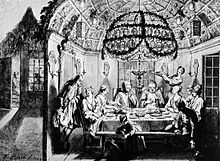Shemini Atzeret
Shmini Azeret or Shemini Azeret (Hebrew שְּׁמִינִי עֲצֶרֶת 'Eighth [Day] of Assembly', German also Schlussfest) is the Jewish holiday immediately following the seven-day Feast of Tabernacles (Sukkot), often considered a component of Sukkot. In Orthodox and Conservative communities in the Diaspora, it is celebrated for two days on the 22nd and 23rd, and in Israel and certain Reform communities, it is celebrated for one day on the 22nd of Tishri, the seventh month of the Jewish calendar, in September or October. The second day of the holiday is called Simchat Torah; where Shmini Azeret lasts only one day, the two holidays coincide. Shmini Azeret was already celebrated in ancient times following Sukkot, while Simchat Torah came into being only in post-Talmudic times.
The holiday is mentioned several times in the Bible, as in Leviticus 23:36 GNB and Numbers 29:35 GNB: "On the eighth day you gather for the great festive assembly; all work must rest on that day," as well as in the description of the dedication of Solomon's temple in Jerusalem (2 Chr 7:9-10 GNB) and in the celebration after the return of the Jews from the Babylonian exile (Neh 8:18 GNB).
According to today's custom, on Shmini Azeret some people still eat in the sukkah, and in the morning the prayer for rain (Hebrew גֶּשֶׁם Geschem) is recited in the synagogue during or before the Musaf prayer, and the request for rain is inserted at the beginning of the eighteen-prayer from that day until the first day of Passover - that is, during the rainy season of the winter half-year in Israel. Except when one of the intermediate days of Sukkot falls on a Sabbath, the Book of Kohelet is read at Shmini Azeret.
Four times a year - on Yom Kippur, Shmini Azeret, the last day of Passover, and the second day of Shavuot - a special memorial prayer, יִזְכֹּר Jiskor ("remembrance"), is recited in the synagogue in memory of the different soul of the father and/or mother. This includes a request for Zedaka for their benefit. Only those whose father and/or mother are no longer among the living remain in the synagogue during the Yiskor prayer. Everyone else leaves, allowing the descendants a serious private moment to unite with their parents in remembrance.

Meal in the Sukkah, Bernard Picart, Amsterdam 1722
Search within the encyclopedia